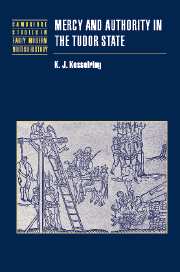Book contents
- Frontmatter
- Contents
- Acknowledgments
- Abbreviations and conventions
- 1 Introduction: mercy and the state
- 2 Changing approaches to punishment and mitigation
- 3 Changing approaches to the pardon
- 4 Patronage, petitions, and the motives for mercy
- 5 Public performances of pardon
- 6 Protest and pardons
- 7 Conclusion
- Appendix I Sources
- Appendix II Benefit of the belly
- Bibliography
- Index
- Titles in the series
2 - Changing approaches to punishment and mitigation
Published online by Cambridge University Press: 05 July 2009
- Frontmatter
- Contents
- Acknowledgments
- Abbreviations and conventions
- 1 Introduction: mercy and the state
- 2 Changing approaches to punishment and mitigation
- 3 Changing approaches to the pardon
- 4 Patronage, petitions, and the motives for mercy
- 5 Public performances of pardon
- 6 Protest and pardons
- 7 Conclusion
- Appendix I Sources
- Appendix II Benefit of the belly
- Bibliography
- Index
- Titles in the series
Summary
Of the sixty-six individuals presented by local constables at the Canterbury quarter sessions in January and July of 1602, forty-four found themselves facing the court for offenses newly defined in the preceding century. Certainly, some were named for assaults and petty thefts that would have earned them a court appearance well before the Tudor years. Elizabeth Roskell, who dug her scythe into Thomas Prichard's back, and Thomas Allen, who nabbed for himself a pair of stockings, would have met with the same fate had they done their deeds long before. On the other hand, John Underdown and John Church had their names brought to the justices' attention for selling ale without license or at prices higher than those set by law, thus violating statutes passed over the last fifty years. Along with other local constables, William Austin and Roger Pattenson were named for their failure to hand over assessments for the support of poor prisoners in a timely fashion, a duty newly imposed in the early 1530s. William Uncle, a butcher from Headcorn, had erected a new fence that encroached on the highway between Snagges Forstal and Water Street. Uncle found that his fence not only inconvenienced his neighbors, but also violated a twenty-seven-year-old statute. Fully two-thirds of the individuals presented at these court sessions were accused of violating laws new to the Tudor period.
- Type
- Chapter
- Information
- Mercy and Authority in the Tudor State , pp. 23 - 55Publisher: Cambridge University PressPrint publication year: 2003



